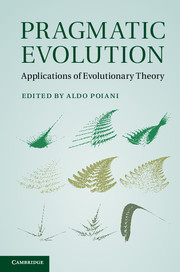Book contents
- Frontmatter
- Contents
- Contributors
- Acknowledgements
- Preface
- Introduction
- Part I Evolution, Ecology and Conservation
- Part II Evolution and Food Production
- Part III Evolution and Medicine
- 6 Evolution: a basic science for medicine
- 7 Evolutionary insights for immunological interventions
- 8 Neuroevolution and neurodegeneration: two sides of the same coin?
- 9 Evolution, music and neurotherapy
- Part IV Evolution and Psychology
- Part V Evolution and Computing
- Part VI Evolution and Society
- Index
- Plate Section
- References
6 - Evolution: a basic science for medicine
from Part III - Evolution and Medicine
Published online by Cambridge University Press: 05 April 2012
- Frontmatter
- Contents
- Contributors
- Acknowledgements
- Preface
- Introduction
- Part I Evolution, Ecology and Conservation
- Part II Evolution and Food Production
- Part III Evolution and Medicine
- 6 Evolution: a basic science for medicine
- 7 Evolutionary insights for immunological interventions
- 8 Neuroevolution and neurodegeneration: two sides of the same coin?
- 9 Evolution, music and neurotherapy
- Part IV Evolution and Psychology
- Part V Evolution and Computing
- Part VI Evolution and Society
- Index
- Plate Section
- References
Summary
The 2009 celebrations of Darwin's birth and the publication of The Origin of Species were grand not only because his discoveries changed biology, but also because they are continuing to benefit society. Nowhere is this more evident than in medicine and public health. You might think that Darwin's discoveries would have been fully applied long ago, but a deep fracture in the intellectual landscape has prevented medicine from making full use of evolutionary biology. This is changing fast. Scientists are now recognising that diseases need evolutionary explanations as well as explanations based only on the body's mechanisms.
The field that tries to understand why natural selection has left the body vulnerable to diseases is called Darwinian medicine. Also called evolutionary medicine, it applies every aspect of evolutionary biology to every problem in medicine and public health. It has grown quickly since 1991 (Williams and Nesse, 1991). Major edited volumes have illustrated the opportunity in areas from infectious disease epidemiology to genetics, anatomy and physiology. The most significant ones are already in second editions (Stearns and Koella, 2007; Trevathan et al., 2007). They are being widely read and studied except, it seems, by physicians. Most doctors never take a course in evolutionary biology before medical school, and evolution is not part of the usual medical curriculum.
- Type
- Chapter
- Information
- Pragmatic EvolutionApplications of Evolutionary Theory, pp. 107 - 114Publisher: Cambridge University PressPrint publication year: 2011
References
- 2
- Cited by



